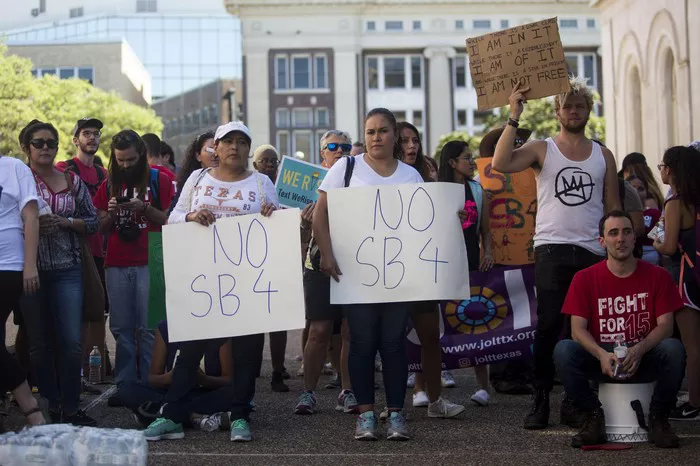Hundreds of protesters converged on downtown Dallas on Sunday, denouncing Texas immigration law SB4 and its potential repercussions. The contentious legislation, if enacted, would empower law enforcement personnel to arrest individuals suspected of unlawfully entering the United States.
Marching through the city streets, more than 200 demonstrators voiced their opposition to SB4, expressing concerns about its impact on migrant communities, particularly Hispanics, across the state. Tony Rodriguez, chair of the Brown Berets of DFW, described SB4 as “one of the most extreme pieces of anti-immigrant legislation” ever passed by a state legislature, labeling it unconstitutional.
SB4, approved by the Texas state legislature in November, criminalizes illegal border crossings into Texas from Mexico, granting local and state law enforcement officers the authority to detain suspected undocumented immigrants. Additionally, the law mandates deportation to Mexico for individuals convicted under SB4.
However, SB4’s implementation has been temporarily halted pending proceedings in the US Fifth Circuit Court of Appeals, where a lawsuit filed by El Paso County and immigrant advocates challenges its legality. Opponents argue that SB4 violates constitutional principles and could lead to racial profiling and discrimination by law enforcement.
Xavier Velasquez, President of La Frontera Nos Cruzó, criticized SB4, claiming it provides law enforcement officers with unchecked authority to target individuals based on their ethnicity. He asserted that the law endangers the Hispanic community in Texas.
In defense of SB4, conservative advocates argue that it is necessary to enhance border security amid escalating migration levels. Texas Governor Greg Abbott emphasized the role of the Texas Department of Public Safety in apprehending thousands of individuals who unlawfully crossed the border, asserting the state’s commitment to enforcing immigration laws.
Despite conservative arguments, protesters remain steadfast in their opposition to SB4, emphasizing the importance of mobilizing public dissent to influence policy decisions. Velasquez highlighted the significance of community engagement, stating, “Getting the people out and showing that we’re not happy, and somebody’s going to listen to us.”
The fate of SB4 hangs in the balance as the Fifth Circuit Court of Appeals prepares to rule on its legality. Following this decision, the constitutionality of SB4 is expected to be deliberated by the US Supreme Court.


